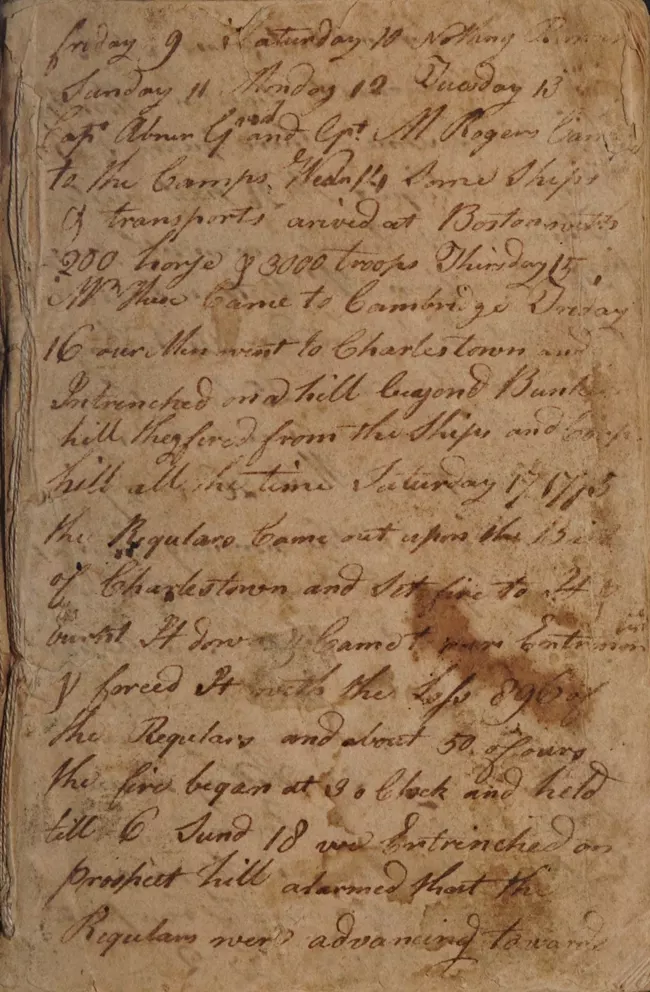“Alarmed that the Regulars were advancing towards Our Entrencment”
Among the presentations at this Saturday’s commemoration of Gen. George Washington’s arrival in Cambridge is a talk by Longfellow House archivist Kate Hanson Plass on the diary of Moses Sleeper.
Hanson Plass and her team have recently shared the diary online: transcription with annotations and illustrations, plus a link to page images on Archive.org.
The introduction explains:
Cpl. Sleeper’s surviving pages start right before the Bunker Hill battle, which his regiment wasn’t involved in. Here’s his terse account of those days:
Sgt. Lunt’s description of the battle offered a little more detail:
Hanson Plass and her team have recently shared the diary online: transcription with annotations and illustrations, plus a link to page images on Archive.org.
The introduction explains:
In the museum collection of the Longfellow House-Washington’s Headquarters National Historic Site is a diary written by a soldier who participated in the early days of the American Revolution. No one knows how the diary got to the house, though it seems likely that a collector in the Longfellow family acquired it for its Revolutionary War connection in the early 20th century.Sleeper and Sgt. Paul Lunt of the same regiment obviously shared their diaries since many of their entries are the same. They weren’t keeping private, personal notes but making a record of their military service for people back home and in the future.
The book itself is small (5” by 8”), pocket size; its cover and the first and last three pages are missing. There is no indication of the identity of the writer of the diary; at first reading it seems to be anonymous. Using clues inside the diary – references to family members and locations of military service – the author has been established as Corporal Moses Sleeper of Newburyport, Massachusetts, who served for 19 months in Colonel Moses Little’s Regiment (later the 12th Continental Regiment).
Cpl. Sleeper’s surviving pages start right before the Bunker Hill battle, which his regiment wasn’t involved in. Here’s his terse account of those days:
Friday 16 our Men went to Charlestown and Intrenched on a hill beyond Bunker hill they fired from the Ships and Copps hill all the time.You wouldn’t know from those entries that Capt. Benjamin Perkins’s company, including Cpl. Sleeper, went onto the Charlestown peninsula on 17 June and saw combat. I’ve quoted later recollections of the Bunker Hill fight from other men in that company: Lt. Joseph Whitmore and Pvt. Philip Johnson.
Saturday 17 1775 the Regulars Came out upon the Back of Charlestown and Set fire to It & burnt It down & Came to our Entrenen[?] forced It with the Loss 896 of the Regulars and about 50 of ours The fire began at 3 o Clock and held till 6
Sund 18 we Entrinched on prospect hill alarmed that the Regulars were advancing towards Our Entrencment but found It to be false Returned to Quarters
Mondy 19 Wee killed Some of there Guard
T 20 Went upon Picquet
W 21 past musters
Thirsday 22 Received our month pay
Sgt. Lunt’s description of the battle offered a little more detail:
Saturday, 17th. - The Regulars landed a number of troops, and we engaged them. They drove us off the hill, and burnt Charlestown. Dr. [Joseph] Warren was lost in the battle: the siege lasted about three hours. They killed about 50 of our men, wounded about 80: we killed of the king’s troops 896, - 92 officers, 104 sergeants.Both Sleeper and Lunt listed an exact number of enemy casualties—a piece of intelligence it usually takes days or weeks to acquire. In Sleeper’s case, we can see that number was written right into the entry, not inserted later. That suggests these provincial soldiers didn’t write their diary entries on the evening after the battle but after time had passed, they had recovered, and they might have had less to do.


No comments:
Post a Comment